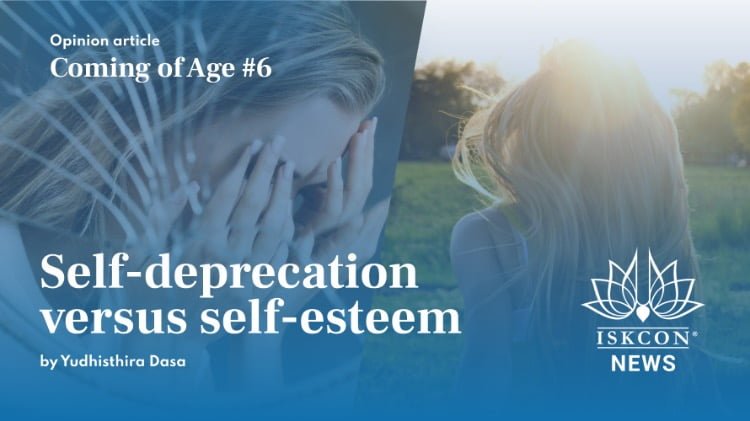COMING OF AGE #6 – Self-Deprecation versus Self-Esteem
By Yudhisthira Dasa | Июл 30, 2023

For committed spiritual seekers, the reality of our shortcomings in this material lifetime becomes more and more clear. Of course, in our lineage, Krishna offers hope again and again, as has Lord Chaitanya. Yet, each day our individual limitations relentlessly stare back at us from the mirror. After all, our consciousness in each lifetime results from unlimited lifetimes and activities, blended with the mercy or grace we receive from the Lord and His representatives.
How do we navigate our limitations as we hear the whisper of our inner voice (the mind and false ego) telling us we are still so far away from unconditionally loving God and all souls, large and small? Here are two of our options:
1. Self-deprecation – this is one way we emotionally survive. Still, excessive self-deprecation can lose its meaning and significance and come at a cost. Self-deprecation manifests as part humor and part seriousness to deflect our insecurities, with statements such as “I am the most fallen,” “I am worthless,” or even “I am lower than a worm in stool.” Ouch. The other option for many is feeling guilty for falling short of that omnipresent highest standard that Srila Prabhupada exemplified. (Note: Read the last “Coming of Age,” where guilt and shame are discussed.)
2. Deflection through humor – it may be sarcasm or slapstick, but joking about ourselves can be an extension of self-deprecation, like an overweight stand-up comic joking about their physical appearance.
The opposite of self-deprecation would be pride. But does pride always ride along with a healthy amount of self-esteem? Or, is self-esteem or self-efficacy needed for most of us just to survive in this world? Yes, an excessive amount of healthy amount of self-esteem or self-confidence can be a slippery slope for many. Still, it is important to note that arrogance and self-esteem are two very different qualities. The essential question is, “Can you have self-confidence without pride?” The answer is a resounding YES!
While even Srila Prabhupada referred to himself as an “insignificant beggar” at times, his dependence on his guru maharaja and Krishna gave him a strong sense of purpose and determination. Self-confidence without arrogance is certainly one of the powerful qualities of a pure devotee of the Lord (in any faith path). Of course, following in the footsteps of a fully realized and eternally liberated soul like Srila Prabhupada without deviation is the topmost goal, but as we have all seen missteps are practically unavoidable. Srila Prabhupada is quoted as saying, “Do not be surprised who leaves (the association of devotees in ISKCON); be surprised who stays.”
What to do? One option is to discriminate between progress and perfection. Perfection is simply not achievable, and even in the abode called Goloka Vrindavan, where Krishna (God) personally resides, the souls continuously dive deeper and deeper into their eternal individual spiritual experiences. In other words, our path of self-improvement does not stop, even when we eventually travel back home, back to Godhead.
So, is self-esteem better than self-deprecation? Here’s a proposal: How about calling it “Soul Esteem”? Forget about all the self-deprecation, and try not to rely too often on the material ego that constantly calls out for fame, adoration, and distinction, all three of which are clear stumbling blocks on the path of bhakti.
Ultimately and originally, we all were inspired to participate in Prabhupada’s ISKCON movement because of the JOY and HAPPINESS it offers. We all would do well to take moments throughout each day to find ways to experience this transcendental joy, regardless of how we best connect and our level of advancement. It is waiting for all of us through the grace of Sri Guru and Gauranga.
















